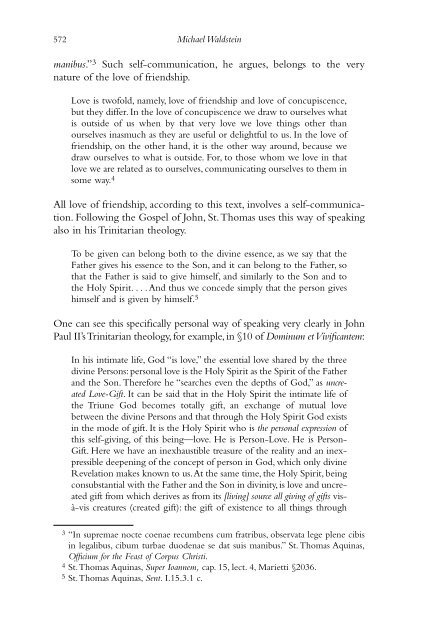The Common Good in St. Thomas and John Paul II WHEN
The Common Good in St. Thomas and John Paul II WHEN
The Common Good in St. Thomas and John Paul II WHEN
Create successful ePaper yourself
Turn your PDF publications into a flip-book with our unique Google optimized e-Paper software.
572 Michael Waldste<strong>in</strong><br />
manibus.” 3 Such self-communication, he argues, belongs to the very<br />
nature of the love of friendship.<br />
Love is twofold, namely, love of friendship <strong>and</strong> love of concupiscence,<br />
but they differ. In the love of concupiscence we draw to ourselves what<br />
is outside of us when by that very love we love th<strong>in</strong>gs other than<br />
ourselves <strong>in</strong>asmuch as they are useful or delightful to us. In the love of<br />
friendship, on the other h<strong>and</strong>, it is the other way around, because we<br />
draw ourselves to what is outside. For, to those whom we love <strong>in</strong> that<br />
love we are related as to ourselves, communicat<strong>in</strong>g ourselves to them <strong>in</strong><br />
some way. 4<br />
All love of friendship, accord<strong>in</strong>g to this text, <strong>in</strong>volves a self-communication.<br />
Follow<strong>in</strong>g the Gospel of <strong>John</strong>, <strong>St</strong>.<strong>Thomas</strong> uses this way of speak<strong>in</strong>g<br />
also <strong>in</strong> his Tr<strong>in</strong>itarian theology.<br />
To be given can belong both to the div<strong>in</strong>e essence, as we say that the<br />
Father gives his essence to the Son, <strong>and</strong> it can belong to the Father, so<br />
that the Father is said to give himself, <strong>and</strong> similarly to the Son <strong>and</strong> to<br />
the Holy Spirit. . . . And thus we concede simply that the person gives<br />
himself <strong>and</strong> is given by himself. 5<br />
One can see this specifically personal way of speak<strong>in</strong>g very clearly <strong>in</strong> <strong>John</strong><br />
<strong>Paul</strong> <strong>II</strong>’s Tr<strong>in</strong>itarian theology, for example, <strong>in</strong> §10 of Dom<strong>in</strong>um et Vivificantem:<br />
In his <strong>in</strong>timate life, God “is love,” the essential love shared by the three<br />
div<strong>in</strong>e Persons: personal love is the Holy Spirit as the Spirit of the Father<br />
<strong>and</strong> the Son. <strong>The</strong>refore he “searches even the depths of God,” as uncreated<br />
Love-Gift. It can be said that <strong>in</strong> the Holy Spirit the <strong>in</strong>timate life of<br />
the Triune God becomes totally gift, an exchange of mutual love<br />
between the div<strong>in</strong>e Persons <strong>and</strong> that through the Holy Spirit God exists<br />
<strong>in</strong> the mode of gift. It is the Holy Spirit who is the personal expression of<br />
this self-giv<strong>in</strong>g, of this be<strong>in</strong>g—love. He is Person-Love. He is Person-<br />
Gift. Here we have an <strong>in</strong>exhaustible treasure of the reality <strong>and</strong> an <strong>in</strong>expressible<br />
deepen<strong>in</strong>g of the concept of person <strong>in</strong> God, which only div<strong>in</strong>e<br />
Revelation makes known to us.At the same time, the Holy Spirit, be<strong>in</strong>g<br />
consubstantial with the Father <strong>and</strong> the Son <strong>in</strong> div<strong>in</strong>ity, is love <strong>and</strong> uncreated<br />
gift from which derives as from its [liv<strong>in</strong>g] source all giv<strong>in</strong>g of gifts visà-vis<br />
creatures (created gift): the gift of existence to all th<strong>in</strong>gs through<br />
3 “In supremae nocte coenae recumbens cum fratribus, observata lege plene cibis<br />
<strong>in</strong> legalibus, cibum turbae duodenae se dat suis manibus.” <strong>St</strong>. <strong>Thomas</strong> Aqu<strong>in</strong>as,<br />
Officium for the Feast of Corpus Christi.<br />
4 <strong>St</strong>.<strong>Thomas</strong> Aqu<strong>in</strong>as, Super Ioannem, cap. 15, lect. 4, Marietti §2036.<br />
5 <strong>St</strong>.<strong>Thomas</strong> Aqu<strong>in</strong>as, Sent. I.15.3.1 c.


